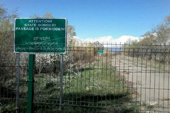
International Federation for Human Rights calls the current situation in South Ossetia 'humanitarian crisis'
By Inga Kakulia
Tuesday, November 26
The International Federation for Human Rights (FIDH) has issued a statement saying that the closure of the so-called check-points has launched a humanitarian crisis in the so-called South Ossetia.
The International Federation for Human Rights and its member organizations - Human Rights Center (Georgia) and the Norwegian/Helsinki Committee are concerned about the humanitarian crisis in the borough of Akhalgori, South Ossetia / Georgia, which has resulted in the closure of checkpoints connecting the South Ossetian region and the rest of Georgia.
According to the organization, the restriction of freedom of movement in the Akhalgori settlement has forced the population into humanitarian isolation. The International Federation for Human Rights and the Human Rights Center calls on the authorities of the de facto authorities of Abkhazia and South Ossetia and the Russian authorities to open checkpoints connecting these regions and the rest of Georgia and stop any illegal attempts to securitize the "administrative boundary line."
The report acknowledges that South Ossetian de-facto authorities closed two checkpoints connecting South Ossetia/Tskhinvali and the rest of Georgia in early September of this year. Due to closure of the checkpoints people from Akhalgori were denied access to medical care and other humanitarian needs, as the only other way to access medical services is to reach Tskhinvali, which requires a lot of financial costs and is far away.
“Residents of the Akhalgori town of Gori came to Georgian-controlled area to get medical services, medicines, product purchases and pensions. Approximately three months ago, the closure of the checkpoint reduced the humanitarian needs of the population of the borough of Akhalgori,” reads the report.
FIDH also touched on the topic detention of a doctor Vazha Gaprindashvili by the Russian Guards. According to family members, the doctor was coming to Akhalgori to treat patients who were denied access to medical care. De-facto authorities charged the doctor with "Illegal Crossing of the Border" and sentenced to two months of pretrial detention. The de-facto authorities also reported that Vazha Gaprindashvili was involved in the August 2008 war as a captain in the military medical service. Family members of the physician and other medical professionals deny the information. According to them, during the war, the doctor worked in a clinic in Tbilisi and treated the wounded war patients. The case of Vazha Gaprindashvili has gained a lot of attention in Georgia, with local authorities now calling for the international bodies to intensify their pressure on the Russian Federation to free the detained doctor.


